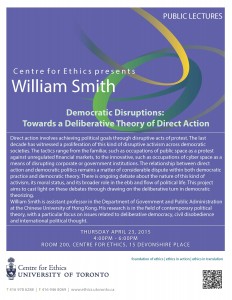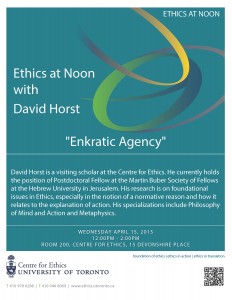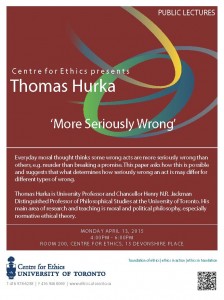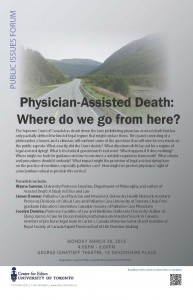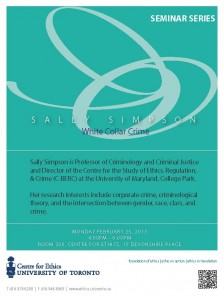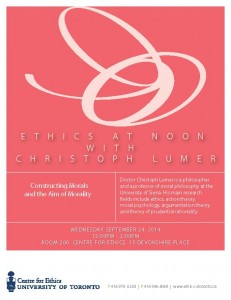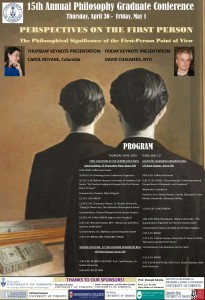 Thursday, April 30 – 9:00 – 3:30 pm
Thursday, April 30 – 9:00 – 3:30 pm
Room 200, Larkin Building
15 Devonshire Place
Category Archives: Events
Democratic Disruptions: Towards a Deliberative Theory of Direct Action
Ethics@Noon with David Horst
“More Seriously Wrong”
Physician-Assisted Death: Where do we go from here
Public Issues Forum
George Ignatieff Theatre, 15 Devonshire Place
Seating is Limited – Register here: https://www.eventbrite.ca/event/16025520764/
Tuesday, March 3
Is the Government Fiscally Blind? An Empirical Examination of the Effect of the Compensation Requirement on Eminent Domain Exercises
Ronit Levine-Schnur
Visiting Scholar
Faculty of Law
Postdoctoral Fellow
Centre for Ethics & Munk School of Global Affairs
University of Toronto
https://utoronto.academia.edu/RonitLevineSchnur
12:00 PM – 02:00 PM
Please Note – Venue Change
Public Issues Forum
Toronto and the Natural City: Facing Our Ecological Future
Monday, March 2
4-6 pm
George Ignatieff Theatre, 15 Devonshire Place
David Miller, President & CEO, World Wildlife Fund Canada; Former Mayor, City of Toronto (Moderator)
Professor Roger Kiel, Faculty of Environmental Studies, York University
Professor Pamela Robinson, School of Urban and Regional Planning, Ryerson University
Olivia Chow, Former Member of Parliament and Toronto City Councillor, and
Professor Stephen Bede Scharper, School of the Environment, University of Toronto
After Reading Week…
Ethics at Noon with Christoph Lumer
This Thursday, September 11th
Comparing the Moral Weight of Global Versus Domestic Poverty
Judith Lichtenberg
Department of Philosophy, Georgetown University
4:00 – 6:00 pm
Room 200, Larkin Building, 15 Devonshire Place
More than a billion people—20 percent of the world’s population—live below the World Bank’s poverty line of $1.25 a day. But there are also many poor people in developed countries. In the U.S., for example, 46 million people, or about 15 percent of the population, live below the U.S. poverty line. How should affluent people assess their comparative moral responsibilities to these two groups? On the one hand, a common approach among philosophers has been to argue that people have special duties to compatriots that take priority over duties to “strangers.” On the other hand, it has been said that the poorest 5 percent of U.S. citizens are richer than two thirds of the people in the world. Clearly these two assertions pull in opposite directions. I attempt to sort out some of these puzzles, in part with the help of the concept of relative deprivation—the extent to which people’s well-being depends on what others around them have.
Manuscript Workshop: A. J. Julius, “Reconstruction”
A workshop on A. J. Julius’s manuscript “Reconstruction” will be held at the Centre for Ethics on Friday, June 6.
The discussion will take place over three sessions, each comprising a set of comments, a reply by the author, and a general discussion.
Schedule
10:30 – 11 Coffee and tea
11 – 12:50 First session
Commentator: Niko Kolodny (Berkeley)
Reply by the author
Lunch break
2 – 3:50 Second session
Commentator: Véronique Munoz-Dardé (UCL and Berkeley)
Reply by the author
Coffee break
4:10 – 6 Third session
Commentator: Arthur Ripstein (Toronto)
Reply by the author
Invited participants: Stephen J. White (Northwestern); Rahul Kumar (Queen’s)
Notes:
1) Participants are expected to read the manuscript in advance. It can be found at http://www.ajjulius.net/reconstruction.pdf.
2) Space is limited; please confirm your attendance by writing to lhodgson@yorku.ca, where you may also direct questions.
Workshop organized by Louis-Philippe Hodgson (York) and Joseph Heath (Toronto)
Maxims and MRIs: Kantian Ethics and Empirical Psychology
Conference program
Friday, May 9
9:30-10:45: Heidi Maibom (University of Cincinnati) “Practical Reason in the Age of Neuroscience”?
11-12:15: Hanno Sauer (Tilburg University) “The Weakest Link. Realism, Debunking, and the Darwinian Dilemma”
1:45-3 Susan Dwyer (University of Maryland) “Is there a Junction for Judgment?”
3:15-4:30 Marijana Vujosevic (University of Groningen) “Conscience as the Specific Rational Deficit of Psychopaths”
4:45-6:00 Pauline Kleingeld (University of Groningen) “Debunking Confabulation: Emotions and the Significance of Empirical Psychology for Kantian Ethics”
Saturday, May 10
10:45-12:00 Joseph Heath (University of Toronto) “Why do People Behave Immorally When Drunk?”
1:45-3 Tom Bates (University of Groningen) “Mixed vs. Moderate Traits: On the Evaluative Status of Empirically Sound Character”
3:15-4:30 Patrick Frierson (Whitman College) “Character in Kant’s Moral Psychology: Responding to the Situationist Challenge”
4:45-6:00 Jeanette Kennett (Macquarie University), “Reactive Attitudes, Reason, and Responsibility”

